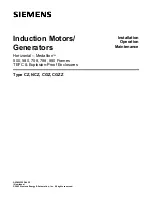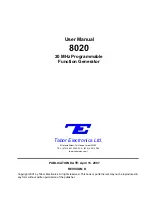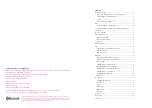
- 6 -
Installation
External Wiring
DANGER
Hazardous
voltage.
Will cause death, serious injury,
electrocution or property damage.
Disconnect all power before working on
this equipment.
NOTE
Before running motor, see
Initial
Start.
Starting and overload control devices must be matched
to motor rating. For safety or convenience they may
need to be installed some distance from the motor.
Follow the control manufacturer’s instructions to make
proper installations and connections. Observe the
following:
1. Connect electrical power supply to conform with
National Electric Code and any local regulations.
Line voltage and wire capacity must match motor
rating stamped on the nameplate.
2. With the driven equipment disconnected,
momentarily energize the motor to check rotation.
3. If motor is three-phase type, reverse rotation (if
required) by interchanging any two of the three
power leads.
Changing Direction of Rotation
Look for rotation plates usually mounted on fan
housing of the motor.
CAUTION
Excessive
heat.
Motor may overheat if motor cooling fans run in the
wrong direction.
Run motor in direction shown on motor or change fans.
External fan direction must be considered if changing
direction of rotation is contemplated on motors
equipped with shaft mounted external fans. See the
following Motor Fan Direction table to identify which
motors have directional external fans. All directional
fans must be replaced with a fan designed for the
desired direction of rotation.
Motor Fan Direction
Motor Speed
Frame
3600 – 3000
RPM
1800 – 1500
RPM
1200 RPM &
SLOWER
500
580
NON-DIRECTIONAL
708
788 DIRECTIONAL
880
NOTE
It will be necessary to rebalance the rotor if the fans are
changed.
Alignment
Accurate shaft alignment between motor and driven
equipment is essential. Improper alignment may result
in vibration, bearing overloads and excessive shaft
stresses. Flexible couplings will not compensate for
excessive misalignment.
NOTE
A basic rule is to not have more than five shims in a shim
pack under any one motor foot. Thick shim packs
consisting of many thin shims will cause soft foot,
excessive vibration or twisted frame (motor foot out of
plane).
Parallel Alignment
After positioning unit for correct end float, separate the
coupling halves and mount a dial indicator rigidly on
one coupling half with the button on the cylindrical
surface of the other half. Rotate the shafts together,
and take readings at top, bottom and side positions.
Align shaft so difference between top and bottom
readings and the side readings is a maximum of
0.002 inch for a flexible coupling.








































